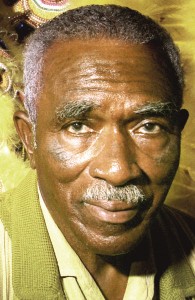Tootie Montana honored by City Council
17th August 2015 · 0 Comments
By Fritz Esker
Contributing Writer
A personal loans great rates little over 10 years ago, Big Chief Allison “Tootie” Montana died unexpectedly while addressing the City Council in an attempt to end violent confrontations between Mardi Gras Indians and the New Orleans Police Department. On August 12, the City Council dedicated the podium in its chambers to Montana’s memory during a meeting of its Criminal Justice Committee.
On June 27, 2005, the 82-year-old Tootie collapsed while addressing the City Council about N.O.P.D. abuse of Mardi Gras Indians during their St. Joseph’s Day celebrations that year. His last words were “I want this to stop.” By the time he reached Charity Hospital, he was pronounced dead.
Between St. Joseph’s Day 2005 and the evening of his death, Tootie worked with other leaders of the Indian community and local officials like Oliver Thomas to make their voices heard about the police’s heavy-handed tactics.
On August 12, Tootie’s family, including his daughter Denise and his son Big Chief Darryl Montana of the Yellow Pocahontas, addressed the council and thanked them for recognizing their father.
“His hard work was not in vain,” Denise said. “My dad is presently smiling in heaven.”
Darryl talked of the discipline his father default on unsecured loan instilled in him through the process of sewing costumes for Mardi Gras. But the life of an Indian wasn’t all work; Tootie passed on a love for the carnival season in his son.
“He felt that there was no reason, no excuse you can come up with for no being out on the street on Mardi Gras Day,” Darryl said.
After members of the Montana family spoke, the Council officially dedicated the podium to Tootie. Guidry said she hopes all citizens who speak there in the future will “draw strength and inspiration from his courage.”
After the dedication, the Indians present sang “Indian Red,” a traditional Mardi Gras Indian prayer often sung at the beginning and end of their gatherings.
Once the singing ended, members of the local Indian community spoke to the Council about what happened in 2005 and how relations have progressed between police and the Indians.
Jerome Smith, founder of the Tambourine and Fan youth organization, spoke about how the police’s 2005 response to the Indians pointed to deeper issues. The violence wasn’t just because of a fear of Mardi Gras Indians. It was because of a deeply ingrained racism.
“The reason they (the N.O.P.D.) did that (St. Joseph’s) night is checks cashed locations the same reason they (white men) murdered Emmett Till,” Smith said.
Big Chief Howard Miller of the Creole Wild West chastised the council for not notifying local chiefs about Wednesday’s council meeting.
“I feel like I’ve been hoodwinked,” Miller said. “We all should’ve been involved.”
Guidry apologized for any misunderstanding. When addressing the 2005 St. Joseph’s Day violence and the progress that followed, Miller had kinder words, especially for then-N.O.P.D. Commander Robert Bardy. Miller said Bardy met with him and other chiefs and listened to their concerns and complaints. Bardy expressed genuine curiosity about the Indians’ culture and what it meant to the community.
“I never talked to police before (Bardy),” Miller said. “I’d never wanted to talk to them before…We now have a better relationship with the police than we have in the past.”
While there were moments of contention, the overall tenor of the meeting was a positive one. Even though there may still be work to be done, the Indian community is hopeful for the future.
“It’s still not easy…We do have issues, but there’s no place like New Orleans,” said Darryl.
This article originally published in the August 17, 2015 print edition of The Louisiana Weekly newspaper.




